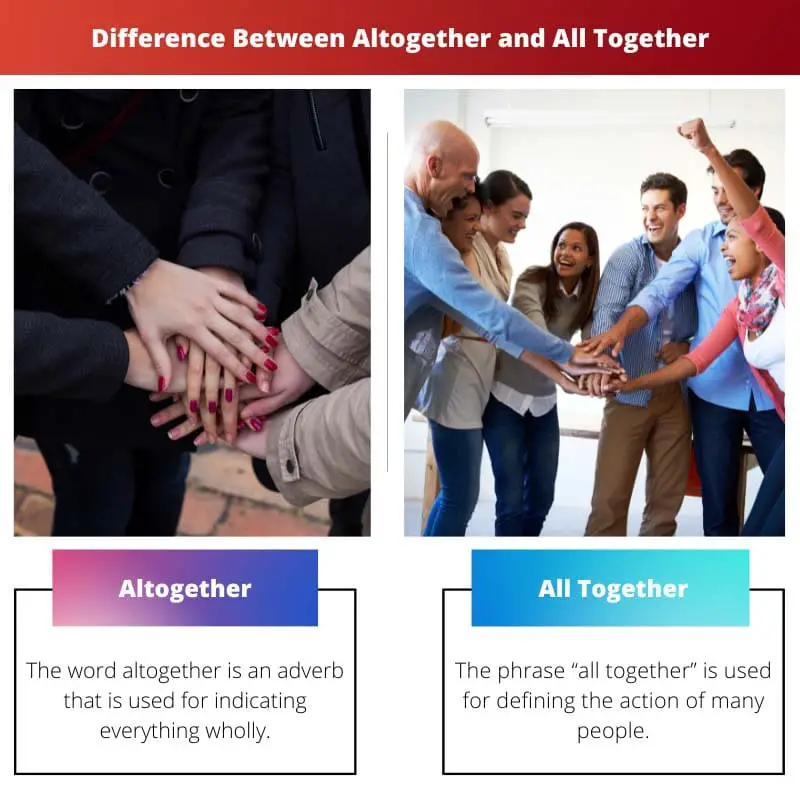Altogether and All together are used in English sentences. The pronunciation of both these words makes them sound similar, but these words should not get used simultaneously.
There are many differences between altogether and all together. The word altogether stands for totally or completely. The word all together stands for the action or presence of people in a group at the same place.
Key Takeaways
- “Altogether” is an adverb that means completely or entirely, while “all together” indicates that multiple things or people are in a group or acting collectively.
- “Altogether” is used to modify or emphasize statements, as in “The project was altogether a success,” while “all together” is used to describe the status or action of a group, as in “They sang the song all together.”
- Both terms have distinct meanings and should not be confused or used interchangeably.
Altogether vs All Together
Altogether is a single-worded adverb that means completely or entirely. For example, I am altogether pleased with your performance. All together is a phrase that means everyone or everything in one place or at one time. For example, We gathered all the books together in one pile.

The word altogether is an adverb that helps in supporting or modifying the verb. The word altogether helps in defining the meaning of a verb in a better manner.
The word altogether is a single word used for representing everything or everyone wholly. People should use “altogether” when everyone is considered at one time.
The phrase all together is for a group of people. You should not use all together at one time as they are two different words. The phrase “all together” is not used for an individual but a group of people.
People should include all together in a sentence, where the action of the people taken in a group.
Comparison Table
| Parameters of Comparison | Altogether | All Together |
|---|---|---|
| Type | Adverb | Phrase |
| Synonyms | Completely, absolutely | All at once |
| Definition | Altogether stands for something happening or has happened in a complete form. | All together stands for a group of people in a similar place or at the same time |
| Other usages | Altogether can use as a substitute for adverbial conjunction | All together can use as a substitute for an adjective |
| Intention | To represent something or the action of a person completely or totally. | To represent many people in one place or group. |
What is Altogether?
The word altogether is an adverb that is used for indicating everything wholly. Altogether is a substitute for words, such as totally and wholly. People should not use the word in two parts.
Altogether is not related to a group, but deals with everything in total. People can use the word altogether for combining different ideas in a sentence.
The word altogether can be used as adverbial conjunction. Time and place are not under the meaning of altogether. Altogether stands for everything wholly or totally without specifying the time of occurrence. The word is a good substitute for all in all.
The use of altogether is in a sentence where many things are getting considered. For example, if someone is talking about many parts of the human body.
Then the person can use it “altogether” for covering all the parts. When you speak about many things or people together in one frame, you can use “altogether.”
The word altogether has a deep meaning as it deals with everything in total. Many people take all together as the substitute for altogether, which is incorrect. Altogether has no similarities with the phrase “all together.”
There is a trick by which you can know where to use the word altogether. If the sentence has “all together.” Then you can remove the word “all” from the sentence. If the meaning of the sentence is not getting affected, then altogether is a good fit for the sentence.
What is All Together?
The phrase “all together” is used for defining the action of many people. The time and place of action have importance in the phrase “all together.”
All together is a phrase that is the best substitute for “at all once.” The real meaning of the phrase “all together” is that it stands for the unity of people.
Nobody should use the phrase in one word as these two are two different words forming one phrase. People can use the phrase “all together” in the place of an adjective.
The phrase “all together” is not used in the form of adverbs. Many people get confused between the words altogether and all together due to their pronunciation, but the word has no similarity.
The phrase all together brings the meaning of unanimously in the sentence. For example, if many people do work together, then the phrase “all together” would be used.
The phrase brings a complete meaning to the sentence. This means the people are doing something at one time in a complete manner.
People should use the phrase “all together” for covering the action of all the people in just two words (all together).
Main Differences Between Altogether and All Together
- Altogether is a single word used in sentences. On the other hand, all together are two different words making a single meaning.
- Altogether belongs to the adverb family, whereas all together is a phrase.
- Altogether represent many things or people at one time. On the other hand, all together helps to know the action of people at one place and time.
- The word altogether can be used as adverbial conjunction, whereas all together work as the substitute for an adjective.
- Altogether means completely, whereas all together means all at once in a group.

- https://www.healthaffairs.org/doi/abs/10.1377/hlthaff.28.5.w863
- https://psycnet.apa.org/record/1989-14054-001
